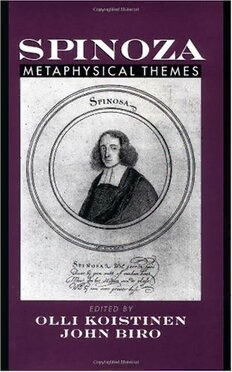Download Spinoza: Metaphysical Themes PDF Free - Full Version
Download Spinoza: Metaphysical Themes by Olli I. Koistinen, John Biro in PDF format completely FREE. No registration required, no payment needed. Get instant access to this valuable resource on PDFdrive.to!
About Spinoza: Metaphysical Themes
Spinoza's philosophy has an undeserved reputation for being obscure and incomprehensible. But now, in this indispensable collection, Spinoza is portrayed in the manner he deserves--as a brilliant metaphysician who paved the way for an exciting new science. The volume focuses on several important areas, including monism, the concept of conatus, the nature of and the relation between mind and body, and Spinoza's relationship to Descartes and Leibniz. The new physics posed difficult questions about the existence and power of God; however, it was commonplace of seventeenth-century metaphysics to claim that all force was God's. In his philosophy, Spinoza solves this problem, identifying God with nature. But, what happens to individuals after that identification? And what is an individual for Spinoza? How does it act? How are its actions explained? This volume clearly addresses these and other fascinating questions. It explores Spinoza's account of the relationship between mind and body, along with his view on the ontology of values. Spinoza saw the threat of deterministic physics to mind-body interaction. How is it possible that minds act on bodies and vice versa? Furthermore, the volume examines the problem of the nature of values, asking is there room for an independent realm of values in the new philosophy? Finally, the collection investigates problems in the interpretation of Spinoza that stem from Spinoza's debatable place in seventeenth-century philosophy; it is often claimed that Spinoza's ideas evolved from Cartesian doctrines while profoundly influencing Leibniz.With a stellar group of contributors--including Michael Della Rocca, John Carriero, Richard Mason, Steven Barbone, Don Garrett, Olli Koistinen, Richard Manning, Peter Dalton, Charles Jarrett, Charles Huenemann, and Mark Kulstad--this volume serves as an excellent resource and represents the best work of a new generation of Spinoza scholars.
Detailed Information
| Author: | Olli I. Koistinen, John Biro |
|---|---|
| Publication Year: | 2002 |
| ISBN: | 9780195128154 |
| Pages: | 260 |
| Language: | English |
| File Size: | 12.672 |
| Format: | |
| Price: | FREE |
Safe & Secure Download - No registration required
Why Choose PDFdrive for Your Free Spinoza: Metaphysical Themes Download?
- 100% Free: No hidden fees or subscriptions required for one book every day.
- No Registration: Immediate access is available without creating accounts for one book every day.
- Safe and Secure: Clean downloads without malware or viruses
- Multiple Formats: PDF, MOBI, Mpub,... optimized for all devices
- Educational Resource: Supporting knowledge sharing and learning
Frequently Asked Questions
Is it really free to download Spinoza: Metaphysical Themes PDF?
Yes, on https://PDFdrive.to you can download Spinoza: Metaphysical Themes by Olli I. Koistinen, John Biro completely free. We don't require any payment, subscription, or registration to access this PDF file. For 3 books every day.
How can I read Spinoza: Metaphysical Themes on my mobile device?
After downloading Spinoza: Metaphysical Themes PDF, you can open it with any PDF reader app on your phone or tablet. We recommend using Adobe Acrobat Reader, Apple Books, or Google Play Books for the best reading experience.
Is this the full version of Spinoza: Metaphysical Themes?
Yes, this is the complete PDF version of Spinoza: Metaphysical Themes by Olli I. Koistinen, John Biro. You will be able to read the entire content as in the printed version without missing any pages.
Is it legal to download Spinoza: Metaphysical Themes PDF for free?
https://PDFdrive.to provides links to free educational resources available online. We do not store any files on our servers. Please be aware of copyright laws in your country before downloading.
The materials shared are intended for research, educational, and personal use in accordance with fair use principles.

